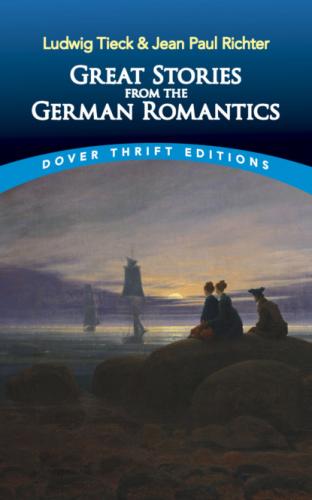GREAT STORIES
FROM THE
GERMAN ROMANTICS
DOVER THRIFT EDITIONS
GENERAL EDITOR: SUSAN L. RATTINER
EDITOR OF THIS VOLUME: TERRI ANN GEUS
Copyright
Copyright © 2020 by Dover Publications, Inc.
All rights reserved.
Bibliographical Note
This Dover edition, first published in 2020, is a reprint of five stories by Ludwig Tieck and two stories by Jean Paul Richter, translated from the German by Thomas Carlyle in Tales by Musaeus, Tieck, Richter, Chapman and Hall, Limited, London, 1827 edition. A Note has been specially prepared for this edition.
Library of Congress Cataloging-in-Publication Data
Names: Tieck, Ludwig, 1773–1853, author. | Jean Paul, 1763–1825, author. | Carlyle, Thomas, 1795–1881, translator.
Title: Great stories from the German romantics / Ludwig Tieck, Jean Paul Richter; translated from the 1827 German edition by Thomas Carlyle.
Other titles: Tales by Musaeus, Tieck, Richter. Selections
Description: Mineola, New York: Dover Publications, Inc., 2020. | Series: Dover thrift editions | This Dover edition, first published in 2020, is a reprint of five stories by Ludwig Tieck and two stories by Jean Paul Richter translated from the German by Thomas Carlyle in Tales by Musaeus, Tieck, Richter, Chapman and Hall, Limited, London, 1827 edition.
Identifiers: LCCN 2020002175 | ISBN 9780486844794 (paperback) | ISBN 048684479X (paperback)
Subjects: LCSH: German fiction—19th century—Translations into English. | Short stories, German—Translations into English.
Classification: LCC PT1327 .T35 2020 | DDC 833/.609145—dc23
LC record available at https://lccn.loc.gov/2020002175
Manufactured in the United States by LSC Communications
84479X01
2 4 6 8 10 9 7 5 3 1
2020
Note
LUDWIG TIECK (1773–1853) WAS born in Berlin and learned Greek, Latin, and Italian during his early school years. His later studies included Shakespeare and Elizabethan drama. In his early twenties, he attempted to make his living by writing short stories. He married and settled in Jena, Germany, in 1798, where his writing won the praise of August and Friedrich Schlegel, leading critics of the early Romantic school. Credited as a founding father of the Romantic movement, Tieck is best known for his fantastic stories and novellas. From 1812 to 1817, Tieck combined his earlier stories and dramas in three volumes under the title Phantasus. This collection featured the stories that appear in this edition. In later life, Tieck served as a literary adviser and art critic at the Court Theater in Dresden and edited the translation of Shakespeare by August Schlegel. In 1842 he was invited to Berlin by Friedrich Wilhelm IV, King of Prussia, where he received a pension and would remain until he died as court author in residence. Tieck became the greatest literary authority in Germany after Johann Wolfgang von Goethe.
Johann Paul Friedrich Richter (1763–1825), better known as Jean Paul, was born in Bavaria, and, after a short course of study in theology, devoted himself to the study of literature. Best known for his witty, humorous, and satirical novels and stories, along with his writings on aesthetics, he was one of the first German Romantic writers. Though his influence was great in the early 1800s, he is the least translated into English. It was around the time of Richter’s move to Berlin in 1800 that he met and became friends with August and Friedrich Schlegel, as well as Ludwig Tieck. At this time, Richter had already written Life of Quintus Fixlein (1796) and a considerable number of other works. His work is characterized by wild metaphors and complex plots, causing some literary critics to hold him in highest regard while others view his work with indifference. Among his admirers was the English writer Thomas Carlyle, who has translated the stories in this edition.
Contents
Army-Chaplain Schmelzle’s Journey to Flätz
LUDWIG TIECK
THE FAIR-HAIRED ECKBERT1
IN A DISTRICT of the Harz dwelt a Knight, whose common designation in that quarter was the Fair-haired Eckbert. He was about forty years of age, scarcely of middle stature, and short light-coloured locks lay close and sleek round his pale and sunken countenance. He led a retired life, had never interfered in the feuds of his neighbours; indeed, beyond the outer wall of his castle he was seldom to be seen. His wife loved solitude as much as he; both seemed heartily attached to one another; only now and then they would lament that Heaven had not blessed their marriage with children.
Few came to visit Eckbert; and when guests did happen to be with him, their presence made but little alteration in his customary way of life. Temperance abode in his household, and Frugality herself appeared to be the mistress of the entertainment. On these occasions Eckbert was always cheerful and lively; but when he was alone, you might observe in him a certain mild reserve, a still, retiring melancholy.
His most frequent guest was Philip Walther; a man to whom he had attached himself, from having found in him a way of thinking like his own. Walther’s residence was in Franconia; but he would often stay for half a year in Eckbert’s neighbourhood, gathering plants and minerals, and then sorting and arranging them. He lived on a small independency, and was connected with no one. Eckbert frequently attended him in his sequestered walks; year after year a closer friendship grew betwixt them.
There are hours in which a man feels grieved that he should have a secret from his friend, which, till then, he may have kept with niggard anxiety; some irresistible desire lays hold of our heart to open itself wholly, to disclose its inmost recesses to our friend, that so he may become our friend still more. It is in such moments that tender souls unveil themselves, and stand face to face; and at times it will happen, that the one recoils affrighted from the countenance of the other.
It was late in Autumn, when Eckbert, one cloudy evening, was sitting, with his friend and his wife Bertha, by the parlour
